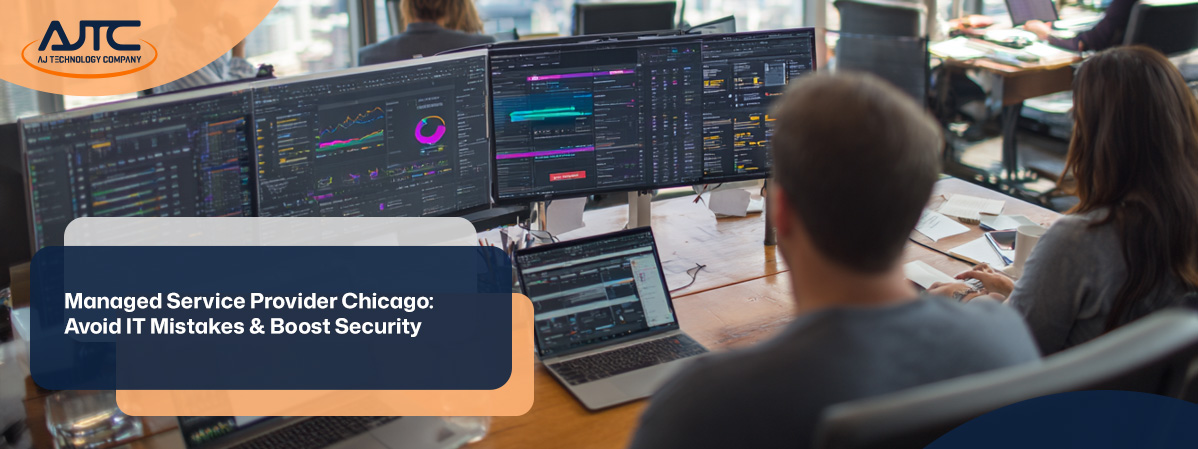.webp)
Chief Executive Officer

Choosing the right managed service provider can make or break your IT strategy. If you're a growing business, you need more than just basic support—you need a partner who understands your goals, helps you stay secure, and keeps your systems running smoothly. In this blog, we’ll cover what to look for in a managed service provider Chicago businesses can trust, common mistakes to avoid, key benefits, and how to put the right plan in place. We’ll also touch on topics like managed it service, proactive cybersecurity, cloud services, disaster recovery, and how to customize your IT setup whether you outsource or co-manage with an in-house team.
A managed service provider (MSP) offers ongoing IT support, monitoring, and management for your business systems. Instead of waiting for things to break, MSPs take a proactive approach to prevent issues before they happen. For businesses in Chicago, this means fewer disruptions, better security, and more time to focus on what you do best.
The right MSP will act as an extension of your team. They’ll help you plan long-term, support your users, and keep your systems up to date. Whether you’re looking to grow, improve cybersecurity, or reduce downtime, a reliable MSP can help you get there.

Picking the wrong MSP can lead to wasted money, security risks, and constant frustration. Here are six common mistakes to avoid:
SLAs define what you can expect from your provider. If you skip over these details, you might end up with slow response times or unclear responsibilities. Make sure your SLA includes guaranteed response times, uptime commitments, and clear escalation paths.
Low-cost providers may cut corners on support, monitoring, or security. While budget matters, it’s more important to look at value. A provider that charges slightly more but delivers consistent, high-quality service will save you money in the long run.
Cyber threats are growing fast. If your MSP doesn’t offer strong cybersecurity tools and practices, your business is at risk. Look for providers that offer firewalls, endpoint protection, and 24/7 monitoring.
Your IT needs will change as your business grows. If your MSP can’t scale with you, you’ll be stuck switching providers later. Ask how they handle growing businesses and what options they offer for expanding services.
Always ask for client references and case studies. A reputable MSP will be happy to share success stories. This gives you insight into how they’ve helped other businesses like yours.
A good MSP should help you plan for the future. If they’re only focused on fixing issues today, you’ll miss out on long-term improvements. Ask how they help clients align IT with business goals.
Here’s what you gain when you work with a trusted MSP:

Local MSPs understand the unique needs of businesses in the Chicago area. They’re familiar with regional regulations, industry trends, and the pace of the local market. This makes them better equipped to offer relevant support and advice.
A provider in Chicago can also respond faster when on-site help is needed. Whether you’re dealing with a network issue or planning a new office setup, having a local team makes a big difference.
MSP solutions go beyond basic IT support. Here are five ways they help your business thrive:
MSPs use tools to monitor your systems 24/7. This means they can detect and fix problems before they affect your team. It also ensures faster response times when issues do come up.
Outdated software is a major security risk. MSPs handle updates and patches for you, keeping your systems protected without disrupting your workflow.
Moving to the cloud can improve flexibility and reduce costs. MSPs help you migrate safely and manage your cloud services so you get the most out of them.
If your data is lost or compromised, recovery can be expensive and time-consuming. MSPs set up reliable backup systems and disaster recovery plans to keep your business running.
A good MSP helps you plan ahead. They’ll work with you to align your IT with your business goals, whether that means upgrading systems, adding new tools, or improving security.

Before you start working with an MSP, take time to assess your current setup. What’s working? What’s not? This helps your provider understand your needs and build a plan that fits.
Next, decide how much control you want to keep. Some businesses prefer to outsource everything, while others want to co-manage with their in-house team. The right MSP will offer flexible options and help you customize your services.
Finally, set clear goals. Whether you want to reduce downtime, improve cybersecurity, or support remote work, your MSP should help you track progress and adjust as needed.
To get the most out of your MSP relationship, keep these tips in mind:
A strong partnership leads to better results.

Are you a business with 20 or more employees looking for reliable IT support? Our team at AJTC specializes in helping growing businesses like yours get the most from their technology. Whether you need full-service IT management or just extra support for your in-house team, we’re here to help.
We understand the challenges of managing IT while trying to grow your business. That’s why we offer flexible, customized MSP solutions designed to meet your needs today and scale with you tomorrow.
A managed service provider handles your day-to-day IT operations so you can focus on running your business. This includes monitoring systems, managing updates, and offering help desk support. For growing businesses, this means fewer disruptions and more time to focus on business goals.
They also help with cybersecurity, disaster recovery, and cloud services. By outsourcing IT to a managed service provider, you get access to expert support without the cost of hiring a full in-house team.
A service provider in Chicago typically offers layered cybersecurity protection. This includes firewalls, antivirus software, and 24/7 monitoring. They also help with employee training to reduce risks from phishing and other threats.
Providers also offer proactive services like vulnerability scans and patch management. These steps help prevent cyber attacks and keep your systems secure. Choosing a provider with strong cybersecurity tools is essential for protecting your business.
A managed IT service gives you consistent support and predictable costs. Instead of reacting to problems, your provider works to prevent them. This keeps your systems running smoothly and reduces downtime.
You also gain access to experts who can help with cloud services, disaster recovery, and long-term planning. Whether you want to improve productivity or migrate to new tools, a managed IT service helps you get there faster.
Chicago managed IT services often include tools for remote work, like secure VPNs and cloud-based collaboration platforms. These tools help your team stay connected and productive from anywhere.
They also provide help desk support and remote monitoring. This means your team can get help quickly, no matter where they’re working. It’s a smart way to support hybrid or fully remote models.
Yes, managed IT services in Chicago can be fully customized. Providers offer flexible plans based on your needs, whether you want full outsourcing or to co-manage with your in-house team.
Customization options include support hours, cybersecurity tools, cloud services, and more. This helps you get exactly what you need without paying for extras you don’t use.
Managed service providers in Chicago understand the local business environment. They’re familiar with regional regulations and industry trends, which helps them offer more relevant support.
They also provide faster on-site service when needed. Whether you’re planning a system upgrade or need help with a network issue, having a local provider gives you an edge.